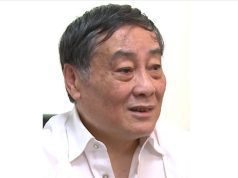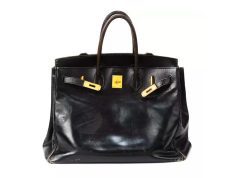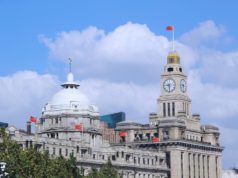Singapore Supreme Court of Singapore Case Summary – Bidzina, Ivanishvili v Credit Suisse Trust Ltd
2nd June 2023 | Hong Kong
This is the case summary of former Georgia Prime Minister Bidzina Ivanishvili lawsuit against Credit Suisse Trust Singapore for losing $1.27 billion and failing to safeguard investments in fraud by private banker Patrice Lescaudron who committed suicide in jail in 2020.
Singapore Supreme Court of Singapore Case Summary – Bidzina, Ivanishvili v Credit Suisse Trust Ltd: See below more case summary and direct link here
Singapore Supreme Court of Singapore

- 26 May 2023
- Case summary
- Bidzina, Ivanishvili v Credit Suisse Trust Ltd [2023] SGHC(I) 9
- Singapore International Commercial Court – Suit No 4 of 2021
Decision of the Singapore International Commercial Court (delivered by Patricia Bergin IJ):
Outcome: The court allows beneficiaries’ claim against a professional trustee for failure to safeguard trust assets.
The parties
1 Mr Bidzina Ivanishvili (“the plaintiff”), his wife, and three of their children are the plaintiffs in the suit (collectively, “the plaintiffs”). The plaintiffs are the beneficiaries of the Mandalay Trust (the “Trust”).
2 Credit Suisse Trust Limited (“the defendant”) is the defendant in the suit and Trustee of the Trust. The defendant is part of the Credit Suisse Group (“Credit Suisse”).
Background to the suit
3 In late 2004, the plaintiff was approached with a proposal that he place his funds with the defendant. At the time, the plaintiff and his business partner had just sold a metallurgical complex in Russia for approximately USD 1.6bn. It was ultimately agreed that the plaintiff would place over USD 1bn on trust with the defendant for the purpose of “Inheritance Planning and Asset Holding”.
4 In 2005, various documents were executed for the setup of the Trust including the declaration of Trust (the “Trust Deed”). The plaintiff signed a letter of appointment in which he purported to reserve as a condition of transferring assets to the Trust, the right to choose (on a continuing basis): (a) the investment manager or advisor who shall be responsible for making decisions as to the assets of the trust; and/or (b) the investment thereof (the “2005 Letter of Appointment”). This letter recorded the plaintiff’s wish that he be appointed the initial investment manager to the Trust.
5 A “Memorandum of Wishes Concerning the Mandalay Trust” was also signed by the defendant at the time the Trust Deed was signed. The purpose of the Memorandum of Wishes was to “record information to assist in the administration of the trust and the exercise of any discretion and powers pursuant to the trust deed”. It identified the plaintiff as “the principal beneficiary” and recorded that: “During his lifetime, the Trustee may have regard to his recommendations in respect of the investment of the Trust Fund, the beneficiaries of the Trust and any distributions to the beneficiaries”.
6 The Trust was initially set up with two underlying companies: Meadowsweet Assets Limited (“Meadowsweet”) and Soothsayer Limited (“Soothsayer”). These companies were held by nominees that were ultimately owned by the defendant. The defendant owned its shares in these companies in its capacity as trustee of the Trust. The corporate directors for these companies where wholly owned by the defendant. The individual directors of the corporate directors included persons who were also directors with the defendant. Later, in 2006, the Trust acquired a third company, Lynden Management Ltd.
7 Meadowsweet held accounts with Credit Suisse AG Geneva Branch (“the Bank”), which was part of the Credit Suisse Group (“Credit Suisse”). Soothsayer held accounts with the Singapore branch of the Bank (the “Singapore Bank”). In March 2005, USD 1.1bn was transferred by the plaintiff into the Meadowsweet accounts. Later that month, USD 550m was transferred from the Meadowsweet accounts to the Soothsayer accounts.
8 From June 2006, the relationship manager (“RM”) of the Bank in respect of Meadowsweet’s accounts was Mr Patrice Lescaudron (“Mr Lescaudron”).
9 Over the next 9 years, Mr Lescaudron fraudulently misappropriated many millions of dollars from the Trust. He embezzled sums of money, purchased securities at above market price, and transferred money between the plaintiffs’ accounts and those of other clients to camouflage his activities. He was subsequently convicted and imprisoned by the Swiss Correctional Court.
10 Mr Lescaudron made many unauthorised payments away or “UPAs” from the Trust. Credit Suisse defined a UPA as a payment from a Credit Suisse Trust structure for which Credit Suisse Trust’s prior approval was not obtained. From December 2006, employees of the defendant warned Mr Lescaudron that he was not to make payments without first obtaining the approval of the defendant. Despite these warnings, Mr Lescaudron continued to effect UPAs from the Trust accounts.
11 In December 2006 a senior officer of the defendant warned colleagues of the dangers of such conduct which included the prospect of “employee fraud”.
12 In March 2008, the defendant was aware of UPAs totalling EUR 10.272m and USD 7.731m from the Trust accounts. In November 2008, the defendant was aware of UPAs totalling EUR 5.729m and USD 4.396m from the Trust accounts. Despite the defendants’ repeated requests to Mr Lescaudron for documentation to verify these UPAs, such documentation was not provided. More than a year later, the defendant had not been able to resolve these UPAs.
13 Mr Lescaudron continued having access to the Trust assets until 2015 when his fraud was exposed.
The admission
14 On the tenth day of trial, the defendant admitted that by 31 December 2008 it had acted in breach of its duty as trustee to safeguard the Trust assets. The defendant accepted that it ought to have, as at 31 December 2008, taken reasonable steps to address the issue of unauthorised transfers from Meadowsweets’ accounts, including directly contacting the plaintiff to verify the propriety of such transfers.
15 The defendant accepted that if direct enquiry had been made with the plaintiff on 31 December 2008, it would have led to a situation where Mr Lescaudron would have been removed permanently as RM. The defendant accepted that one alternative consequence was that the Trust assets would have been moved to another financial institution.
16 The defendant contended that notwithstanding its admission it is not liable to the plaintiffs for losses beyond the moneys misappropriated by Mr Lescaudron and is protected from liability by reason of the plaintiff acting as Investment Manager in a reserved powers trust.
Decision
17 The nature of a reserved powers trust, as propounded by the defendant, was one in which there was no room for the sharing of investment responsibilities between the trustee and the settlor or beneficiary. A trust arrangement is developed to fit the requirements of each beneficiary and the willingness of the trustee to take on the trustee responsibilities. The relevant legislation in Singapore recognises the possibility of a settlor or beneficiary having investment powers over some of the Trust assets, leaving the trustee with investment powers over the residuum: at [435]–[436].
18 There was concurrent management of the Trust assets, part by the plaintiff and part by the defendant through Meadowsweet and Soothsayer with the Bank and the Singapore Bank. The protection in respect of the defendants’ liability as provided in the Trust Deed only applied to those assets that were being managed by the plaintiff: at [482]–[483] and [485].
19 In all the circumstances and having regard to the events between late 2006 and March 2008 it was clear that by no later than March 2008 any individual or professional trustee acting honestly and in good faith in compliance with its duty to safeguard the Trust assets would have had no justification for continuing to allow Mr Lescaudron to have access to the Trust assets. The failure to preclude such access by no later than 30 March 2008 was a breach of the defendant’s duty to the plaintiffs to safeguard the Trust assets: at [522].
20 The losses that flowed from the defendant’s breach of trust were not limited to the funds that were stolen by Mr Lescaudron. The Trust assets, as a whole, were vulnerable to Mr Lescaudron’s fraudulent manipulation in support of the deceitful scheme that he had constructed and implemented. This manipulation included not only theft of funds but also the movement of funds into and out of investments to enable Mr Lescaudron to cover his tracks and losses to keep his scheme afloat and to earn him millions of dollars and/or euros in commissions. These so called ‘investments’ were the vehicles he used to achieve his fraudulent goals. These investments were sometimes unsuitable and at other times overconcentrated. However, but for those that were managed by the plaintiff, they were all part of Mr Lescaudron’s scheme. The fact that he was permitted to continue in his role was causative of the losses beyond the misappropriations suffered by the plaintiffs: at [542].
21 The consequence of the breach by the defendant in failing to safeguard the Trust assets as at 30 March 2008 was that it was liable to the plaintiffs for the difference between the value of the portfolio that was not affected by fraud and would have been managed by a professional, competent trustee and the value of the portfolio managed by the defendant: at [545].
22 The defendant was not entitled to rely on the defence of contributory negligence. When a trustee fails to safeguard trust assets it is in breach of an equitable duty to the beneficiaries. The admitted breach and the breach found to have been committed as at 30 March 2008 were breaches of an equitable duty, not a duty of care in tort: at [563].
23 The defendant was not entitled to be relieved of liability pursuant to s 60 of the Trustees Act 1967 (2020 Rev Ed). Any trustee acting honestly and in good faith in compliance with its duty to safeguard the Trust assets, would have had no justification for continuing to allow Mr Lescaudron to have access to the Trust assets from 30 March 2008.The defendant’s conduct was not reasonable. It tolerated Mr Lescaudron’s flagrant breaches, preferring his importance in retaining the plaintiff as a client over compliance with its core obligation of keeping the Trust assets safe: at [573]–[575].
24 In the circumstances, the appropriate model to quantify the plaintiffs’ losses was that which represented the position in which all assets were withdrawn from the Trust at the relevant date of breach and invested in a benchmark portfolio, the result of which investment at the end of the relevant period was compared with the portfolio in the defendant’s custody. Having regard to the plaintiff’s management of the investment in Russian shares and precious metals until 2008, the appropriate model was that which excluded such trading in Russian shares and precious metals up to 31 December 2008: at [596], [597], [690].
This summary is provided to assist in the understanding of the Court’s grounds of decision. It is not intended to be a substitute for the reasons of the Court. All numbers in bold font and square brackets refer to the corresponding paragraph numbers in the Court’s grounds of decision.
Credit Suisse Loses Singapore Lawsuit, To Pay $926 Million to Former Georgia Prime Minister Bidzina Ivanishvili for Losing $1.27 Billion & Failing to Safeguard Investments in Fraud by Private Banker Patrice Lescaudron Who Committed Suicide in Jail in 2020

26th May 2023 – Credit Suisse has lost the $1.27 billion lawsuit in Singapore, and will pay $926 million to former Georgia Prime Minister Bidzina Ivanishvili for Credit Suisse Trust Singapore losing $1.27 billion and failing to safeguard investments in fraud by private banker Patrice Lescaudron who committed suicide in jail in 2020. The settlement amount of $926 million, includes $79.4 million in an earlier judgement. There will be no double counting of settlement, and the $926 million will also include more than $500 million of settlement for Credit Suisse Life Bermuda lawsuit in April 2022. Singapore Judge Patricia Bergin: “The loss suffered by the plaintiffs is the difference between what would have been achieved if the whole portfolio had been removed and managed by a competent, professional trustee and the trust assets were not affected by fraud, and what was actually achieved.” More info below.
Credit Suisse Paid $210 Million to Former Georgia Prime Minister Bidzina Ivanishvili, Ongoing Lawsuit for Credit Suisse Trust in Singapore for Losing $1.27 Billion & Failing to Safeguard Investments in Fraud by Former Switzerland Based Private Banker Patrice Lescaudron
16th February 2023 – Credit Suisse has paid $210 million to former Georgia Prime Minister Bidzina Ivanishvili, with an ongoing lawsuit against Credit Suisse Trust in Singapore for losing $1.27 billion and failing to safeguard investments in fraud by former Switzerland-based Private Banker Patrice Lescaudron. In 2022 September, former Georgia Prime Minister Bidzina Ivanishvili sued Credit Suisse Trust in Singapore for losing $1.27 billion for failing to safeguard his investments in a fraud committed by former Switzerland-based private banker Patrice Lescaudron. The trial began in Singapore on the 5th of September 2022. At the opening statement, Credit Suisse Trust had calculated the losses at $818.2 million, instead of the estimate of $1.27 billion by Bidzina Ivanishvili. Former Georgia Prime Minister Bidzina Ivanishvili statement at the opening: “Since 2015, former Georgia Prime Minister Bidzina Ivanishvili had placed $1.1 billion under the custodianship of the Credit Suisse Trust.” Earlier in April 2022, Credit Suisse Life Bermuda has lost a $500 million lawsuit to former Georgian Prime Minister Bidzina Ivanishvili for illegal trades by former Credit Suisse Private Banker Patrice Lescaudron that resulted in hundreds of millions of losses. In 2018, former Credit Suisse Private Banker Patrice Lescaudron was convicted in Switzerland for forging client signatures to 5 years imprisonment, and later committed suicide in 2020. More info below.
Former Georgia Prime Minister Bidzina Ivanishvili Sues Credit Suisse Trust in Singapore for Losing $1.27 Billion, Failed to Safeguard Investments in Fraud by Former Switzerland Based Private Banker Patrice Lescaudron

8th September 2022 – Former Georgia Prime Minister Bidzina Ivanishvili has sued Credit Suisse Trust in Singapore for losing $1.27 billion for failing to safeguard his investments in a fraud committed by former Switzerland-based private banker Patrice Lescaudron. The trial began in Singapore on the 5th of September 2022. At the opening statement, Credit Suisse Trust had calculated the losses at $818.2 million, instead of the estimate of $1.27 billion by Bidzina Ivanishvili. Former Georgia Prime Minister Bidzina Ivanishvili statement at the opening: “Since 2015, former Georgia Prime Minister Bidzina Ivanishvili had placed $1.1 billion under the custodianship of the Credit Suisse Trust.” Earlier in April 2022, Credit Suisse Life Bermuda has lost a $500 million lawsuit to former Georgian Prime Minister Bidzina Ivanishvili for illegal trades by former Credit Suisse Private Banker Patrice Lescaudron that resulted in hundreds of millions of losses. In 2018, former Credit Suisse Private Banker Patrice Lescaudron was convicted in Switzerland for forging client signatures to 5 years imprisonment, and later committed suicide in 2020.
Credit Suisse Loses $500 Million Lawsuit to Former Georgian Prime Minister for Illegal Trades by Private Banker Who Later Committed Suicide, $300 Million Lawsuit in Singapore
Credit Suisse Life Bermuda has lost a $500 million lawsuit to former Georgian Prime Minister Bidzina Ivanishvili for illegal trades by former Credit Suisse Private Banker Patrice Lescaudron that resulted in hundreds of millions of losses. In 2018, former Credit Suisse Private Banker Patrice Lescaudron was convicted in Switzerland for forging client signatures to 5 years imprisonment, and later committed suicide in 2020. Georgian Prime Minister Bidzina Ivanishvili has also filed a $300 million lawsuit against Credit Suisse in Singapore. Credit Suisse: “The judgment relates to life insurance policies of one client of Credit Suisse Life Bermuda. The life insurance subsidiary has been closed to new business and in wind-down for more than seven years and has no other material business that will be affected by this judgment. The judgment is not yet final and is subject to appeal, which Credit Suisse Life Bermuda intends to vigorously pursue.”
About Credit Suisse
Credit Suisse is one of the world’s leading financial services providers. Our strategy builds on Credit Suisse’s core strengths: its position as a leading wealth manager, its specialist investment banking capabilities, and its strong presence in our home market of Switzerland. We seek to follow a balanced approach to wealth management, aiming to capitalize on both the large pool of wealth within mature markets as well as the significant growth in wealth in Asia Pacific and other emerging markets, while also serving key developed markets with an emphasis on Switzerland. Credit Suisse employs approximately 51,410 people. The registered shares (CSGN) of Credit Suisse Group AG, are listed in Switzerland and, in the form of American Depositary Shares (CS), in New York. Further information about Credit Suisse can be found at www.credit-suisse.com.
Sign Up / Register
Caproasia Users
- Manage $20 million to $3 billion of assets
- Invest $3 million to $300 million
- Advise institutions, billionaires, UHNWs & HNWs
Caproasia Platforms | 11,000 Investors & Advisors
- Caproasia.com
- Caproasia Access
- Caproasia Events
- The Financial Centre | Find Services
- Membership
- Family Office Circle
- Professional Investor Circle
- Investor Relations Network
Monthly Roundtable & Networking
Family Office Programs
The 2025 Investment Day
- March - Hong Kong
- March - Singapore
- July - Hong Kong
- July - Singapore
- Sept- Hong Kong
- Sept - Singapore
- Oct- Hong Kong
- Nov - Singapore
- Visit: The Investment Day | Register: Click here
Caproasia Summits
- The Institutional Investor Summit
- The Investment / Alternatives Summit
- The Private Wealth Summit
- The Family Office Summit
- The CEO & Entrepreneur Summit
- The Capital Markets Summit
- The ESG / Sustainable Investment Summit





































